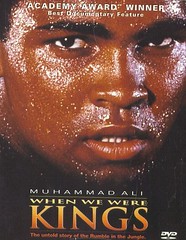Documentary Evidence:

Documentaries are difficult movies for me to review and highlight, as I am typically looking for something different out of those films than I would be from a conventional narrative. To me the more successful ones either highlight a particular figure whose charisma or personal narrative is compelling enough to movie the story along. Strong examples of this include Errol Morris' works The Fog of War or Mr Death. In other cases it is the focus on a particularly dramatic or engaging situation. A good example is Capturing the Friedmans, which centers on a child molestation case that seems very clear cut at the start, but fragments into a very divided perspective by the end of the film. When one combines both elements, you wind up with a film that rises well above its genre to be something more than just a retelling of history.
When We Were Kings documents the lead up to the famed "Rumble in the Jungle" championship boxing match between the then heavyweight champion George Foreman and Muhammad Ali. Ali was freshly off his suspension from boxing stemming from his conscientious objection to the war in Vietnam and refusal to enter the draft. Believed by many to be well past his prime going into the fight, Ali was a significant underdog to an opponent in Foreman who had demolished some of the hardest hitters ever to fight in the heavyweight category.
Taken from just those facts it would be easy to dismiss the film as just another sports related "greatest hits" highlight reel. Three elements elevate the film to something much loftier than that:
- Historical perspective and context - Director Leon Gast provides extensive commentary from sportswriters and newsmen who draw Ali's objector status to the war out in the larger historical context. The film shows what kind of impact a figure with Ali's status had on the societal perspective of the war in sacrificing his position as a successful African American athlete and cultural icon for a higher principle.
There's also an extensive look at why the fight was held in Zaire. Putting the match against the backdrop of a country coming out of revolution, looking for exposure, and run by a ruthless dictator in President Mobutu shows simultaneously how small sporting contest should appear in the greater scheme of things while at the same time also showing the potential cultural impact the fight would have. - Societal context - The cultural impact was also not only defined by the fight but by all the events that were scheduled around. Boxing promoter Don King, who has come to symbolize everything imaginable that is wrong with boxing, at the time had put his professional career on the line promoting this fight in a country most people had not even heard of. There was also a series of concerts King was staging in the lead in to the fight, and the archival footage Gest found helps give the film an added voice and life. The concert footage included vintage performances by James Brown, BB King, and Miriam Makeba. Combined with commentary from Spike Lee and George Plimpton amongst others, Gest conveys a complete picture of what the moment in history he was trying to capture really felt like at the time.
- Muhammad Ali - The above two elements by themselves would make a fine film, but Gest also chooses some of the best archive footage of Ali to take the film completely over the top. Ali is without a doubt one of the most distinctive personalities of the 20th century. In footage of his youth celebrating his victory over Sonny Liston to become heavyweight champ for the first time, Ali (the using the name Cassius Clay) is the picture of youth brass and arrogance packed to the gills in a body that might be as close to physical perfection as I've seen in anyone, man or woman. Contrasted with footage filmed leading up to the fight in which Ali is still brash even if physically he isn't what he once was, I can't help but be captivated by the man's unbridled charisma. I think we may never see that combination of physical strength, gifted articulation of ideas, and sharp intelligence in one person again. Seeing Ali today ravaged by Parkinson's you almost would not believe the mind that lies trapped in the trembling body. But there's still a glint in his eye that runs all through the film and is still there in him today that tells you the body can not set limits on his mind and spirit.



<< Home